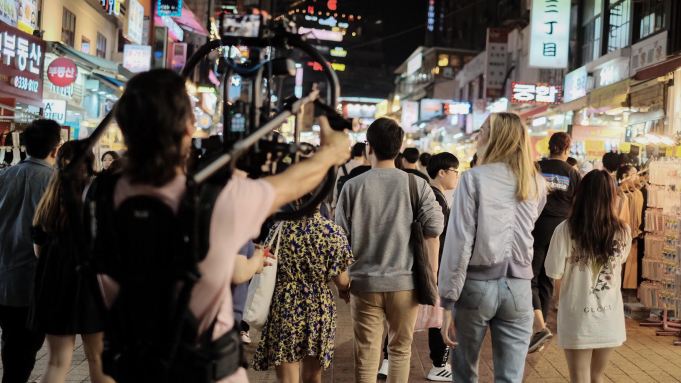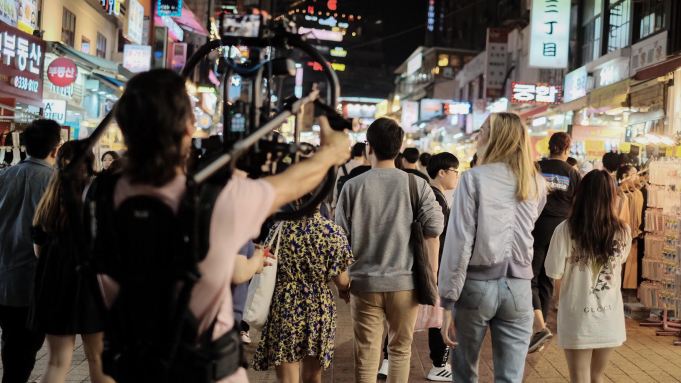
Content Warning: Suicide
VICE Investigates‘ fourth episode, “K-Pop Machine” follows correspondent Charlet Duboc as she looks at the K-Pop industry. In December 2017, K-Pop star and SHINee singer Kim Jong-hyun’s suicide rocked the K-Pop world and shed light on just how micro-managed its stars are.
The episode starts by introducing us to the K-Pop band Monsta X. Like many K-Pop bands, Monsta X was formed from a reality show, its members have various skills including being able to rap and dance intricate choreography. Some of the members also speak English as a way to communicate with Western fans. Monsta X is the quintessential product of the K-Pop industry, an industry that focuses as much on the music of their artists as their look.
While speaking with Monsta X, Duboc was able to shadow the set during the shooting of their music video for “Who Do You Love?” Behind the scenes, it was easy to see just how much focus there is on the physical look of the group from the director fussing about hair and makeup to calling out a member for not looking at the camera enough.
That focus on image didn’t happen overnight. “K-Pop Machine” expands on the history of K-Pop itself, going as far back as the 1990s and the Lee Soo-man, the chief producer at SM Entertainment. Lee was inspired by MTV and Michael Jackson and set out to translate that cultural power for the Korean market. He created a factory model that gave agencies control over their artists. From the music to their look, Lee had a formula that could determine the success of any artist. But K-Pop’s global appeal didn’t just happen because of Lee. DJ Steve Aoki was a big proponent of bringing the genre to the West, citing that it is a positive force and one of the first times since Bruce Lee that he has seen Asian culture change the face of the world.
Fans of K-Pop feel a kinship with other fans and a duty to promote new albums, pictures, or whatever of their favorite groups. K-Pop artists are more active on social media than fans of other musicians which helps fans create a feeling of intimacy with their favorite artists. By sharing personal stories, fans also feel closer to their favorite idols. One Monsta X fan during “K-Pop Machine” speaks about how the band saved her life. Seeing their Instagram live and their personal message about youth stopped her from committing suicide that night. The emotional moment resonates with me. This is followed up by Duboc speaking to Monsta X directly who comment that they feel a responsibility toward their fans especially since some have commented that their music has helped them deal with depression. While I am not part of any K-Pop fandoms, I do credit certain pieces of media for keeping me alive during difficult points in my life. And while so much of the K-Pop world is manufactured, that statement from Monsta X felt incredibly real, with one member even getting emotional.
While social media interaction is one thing, Lee has another idea on the horizon. He hopes to ensnare fans further with digital copies of fan’s favorite K-Pop stars. A fan, on a mobile phone, can watch their favorite artist say their name, sing their favorite song, suggest what they should wear, and so forth. This is just another example of how K-Pop stars are seen as perfect with images catered to audiences. However, that image is slipping. Recently, K-pop idol Seungri was investigated for planning to bribe foreign investors with prostitutes after a series of messages leaked. With those messages, other idols were implicated in the scandal which included idols sharing footage they had taken of women they raped.
Following the scandal, the pressure is on as fans and agencies expect a lot from their stars. While on set with Monsta X, Duboc mentioned their day would be about 15 hours. In addition, the band commented that this was the norm for them and they don’t get time to rest. That work ethic extends to young folk trying to break into the industry as well. With so much competition in the industry, it is easy to demand such a high work ethic.
The “K-Pop Machine” shows the dark side of K-Pop and pulls back the curtain on just how much is real. The episode culminates around Kim Jong-hyun’s suicide and drives home how unhealthy the expectations set on these idols are and how few resources they are given if they feel unwell. The somber ending that had me tearing up delivers a necessary message, especially considering K-Pop continues to grow and Korea’s stigma on suicide and mental health. However, there is hope. As fans speak out in support of K-Pop groups getting the support they need and groups like BTS take a break for their mental health, more agencies will see the value in taking care of their artists.
VICE Investigates is streaming now on Hulu with “K-Pop Machine” dropping on December 6, 2019.
VICE Investigates Episode 4 - K-Pop Machine
-
VICE Investigates Episode 4 - K-Pop Machine - 10/1010/10
TL;DR
The “K-Pop Machine” shows the dark side of K-Pop and pulls back the curtain on just how much is real. The somber ending that had me tearing up delivers a necessary message, especially considering K-Pop continues to grow and Korea’s stigma on suicide and mental health.







